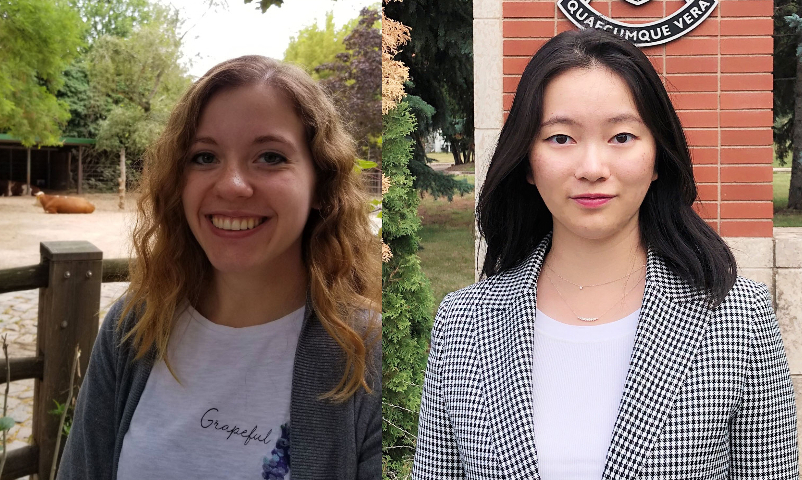Adding molecule to brain could be key to treatment for myelin disorders such as MS, study shows
Jon Pullin - 13 April 2022

NMHI PhD student Nicole Dittmann and Department of Psychiatry master’s student Jessica Li. Photos supplied.
A study by two University of Alberta students has led to hope for future treatments of multiple sclerosis (MS).
Current Neuroscience and Mental Health Institute (NMHI) PhD student Nicole Dittmann and Department of Psychiatry master’s student Jessica Li both worked in the lab of Anastassia Voronova during their study, with Li beginning the project and collecting data and Dittmann taking on data analysis and revisions. Voronova is an assistant professor in the Department of Medical Genetics and Canada Research Chair and is a member of both NMHI and the Women and Children's Health Research Institute (WCHRI).
Their study, “Hepatoma derived growth factor enhances oligodendrocyte genesis from subventricular zone precursor cells,” was published in ASN Neuro and looked at how brain cells called oligodendrocytes, which produce myelin or brain white matter, could be regenerated in the brain.
Focus on brain communication
MS is one of the most common chronic degenerative conditions diagnosed in young adults and children. The prevalence of MS in Canada is among the highest reported globally. It affects women more than men at a rate of up to 3:1.
The disease affects the brain and spinal cord. Myelin, the white-matter insulating layer that forms around nerves, allows quick and efficient communication along the nerve cells. When this layer gets worn away by inflammation, the nerve impulses that travel through the body are slowed, causing neurological problems in people with MS. Regeneration of myelin has been identified as a key therapeutic goal for people with MS.
A major focus of Voronova's lab is studying how the stem cells in the brain communicate with nerves and finding out if scientists can harness the brain's ability to repair itself.
Goal to increase oligodendrocytes
“Oligodendrocytes are the myelin-producing cells in our brain,” says Li, who started working on the study during a cell biology research course in the second year of her undergraduate studies. “Previously in the Voronova lab, we discovered that adding hepatoma-derived growth factor (HDGF) to neural stem cells grown in a dish increased their transformation into oligodendrocytes.”
“If we can increase oligodendrocytes, we could potentially produce more myelin. So for this study, we asked: Does HDGF increase oligodendrocytes in the brain as well?”
The team found that in fact, it does.
What comes next?
“Regardless of whether we added HDGF to neural stem cells in culture or if we infused it directly into the brain, both methods led to an increase in the formation of oligodendrocytes,” says Dittmann. “This was a robust finding and the results have really exciting implications in the context of possible MS therapy.”
As this study was done using a healthy mouse model, the next step will be using HDGF in mouse models of MS.
“This will get us closer to answering whether HDGF could be used to improve remyelination in an MS condition,” says Dittmann. “We can also start looking at the potential for new therapeutics and treatments for other neurological conditions.” As myelin insufficiencies have been shown in other diseases like Parkinson’s and autism, the team is excited to test HDGF in the future in mouse models of these neurological disorders as well.
Encouraging student research
For students interested in pursuing research, Voronova recommends enrolling in the cell biology program during their undergraduate studies.
“Cell biology research courses and additional summer studentship opportunities have been wonderful for undergraduates’ development as scientists and researchers,” says Voronova.
Jessica Li’s summer studentship was funded by the Stollery Children’s Hospital Foundation through the Women and Children's Health Research Institute and by a Natural Sciences and Engineering Research Council of Canada undergraduate summer research award. Nicole Dittmann was funded by the Brad Mates E Drive Studentship in Parkinson's Disease and Movement Disorders through the Neuroscience and Mental Health Institute.